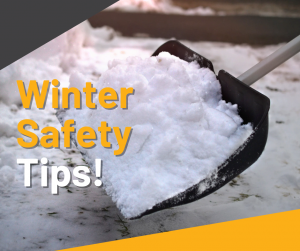 Winter can be a magical season, with beautiful snowy landscapes and cozy evenings, but it also comes with its own set of unique challenges, especially for older adults. Cold weather, icy conditions, and shorter days can increase the risk of accidents and health issues. Here are some practical tips to help you stay safe, healthy, and comfortable during the winter months.
Winter can be a magical season, with beautiful snowy landscapes and cozy evenings, but it also comes with its own set of unique challenges, especially for older adults. Cold weather, icy conditions, and shorter days can increase the risk of accidents and health issues. Here are some practical tips to help you stay safe, healthy, and comfortable during the winter months.
1. Prevent Falls
Slippery sidewalks and icy driveways are a major hazard in winter. Protect yourself with these tips:
- Wear proper footwear: Invest in boots with non-slip soles for better traction. You can also buy ice cleats that attach to your boots for extra security, although they do require some strength to put on and take off. Visit Rate My Treads, a project from UHN, to see the best-rated footwear for winter.
- Avoid ice build-up: Keep pathways and driveways clear with salt or sand.
- Walk carefully: Take slow, deliberate steps, and use railings or walking aids as needed.
- Stay indoors during storms: Avoid venturing out when conditions are particularly bad.
2. Dress for the Weather
Cold temperatures can lead to frostbite or hypothermia, especially for those with circulation issues.
- Layer up: Wear several layers of clothing to trap heat effectively. Include a warm hat, scarf, and gloves.
- Cover your face: Use a scarf to protect your skin from the wind and keep your nose and mouth warm.
- Choose the right fabrics: Wool and synthetic materials retain heat better than cotton, and wick moisture away from your skin. In addition, wool can absorb 30% of its weight in water without feeling wet at all – a great thing to wear if you’re outdoors when it’s snowing.
3. Stay Warm Indoors
It’s just as important to stay warm at home as it is outside.
- Set your thermostat: If you have control over your thermostat, make sure to keep your home at least 20°C to avoid hypothermia. If you are located in a colder part of a building, or are unable to set your thermostat, use a space heater to warm up the room. Be sure to follow manufacturer instructions for your space heater, and never leave it unattended.
- Check for places where heat can escape: Seal drafts around windows and the bottoms of doors to retain heat. Here are some tips from Natural Resources Canada.
- Have extra blankets on hand: They’re a simple way to stay cozy without increasing heating costs.
4. Eat Well and Stay Hydrated
Winter can reduce your thirst, but hydration and proper nutrition are key to staying healthy.
- Drink water regularly: Even if you’re not thirsty, aim for 6–8 glasses of water daily.
- Enjoy warm meals: Soups, stews, and hot drinks can provide warmth and energy.
- Stock up on groceries: Keep non-perishable food items at home to minimize trips in bad weather. Read our list of foods to have on hand for emergency situations.
5. Prepare for Emergencies
Winter storms can cause power outages or make roads unsafe.
- Create an emergency kit: Include water, non-perishable food, flashlights, batteries, and a first aid kit.
- Charge devices: Keep your phone and other essential electronics fully charged.
- Have a contact list: Keep phone numbers for family, friends, and emergency services handy.
6. Take Care of Your Health
Cold weather can exacerbate existing health conditions.
- Get a flu shot: Protect yourself from seasonal illnesses.
- Check your medications: Ensure you have enough medication to last through potential storms.
- Stay active indoors: Light exercises like stretching or yoga can keep your joints limber and improve circulation. We offer virtual exercise classes that can be done from the comfort of your own home.
7. Ask for Help When Needed
There’s no shame in seeking support when winter challenges arise.
- Arrange for snow removal: Hire someone or ask a neighbour to help with shovelling. The City of Tornto does not clear snow on private property, however, there are some community agencies that may be able to assist seniors with snow clearing.
- Use delivery services: Many stores offer online ordering and delivery for groceries and medications. There are also some agencies that offer shopping and grocery assistance.
- Stay connected: Check in with friends, family, or neighbours regularly for support and companionship. Circle of Care offers social activities and groups for seniors to stay connected to others.
Winter doesn’t have to be daunting. With the right precautions, you can enjoy the season while staying safe and healthy. Remember, staying prepared and mindful of your environment is the key to a worry-free winter. Stay warm, stay safe, and make the most of the season!


